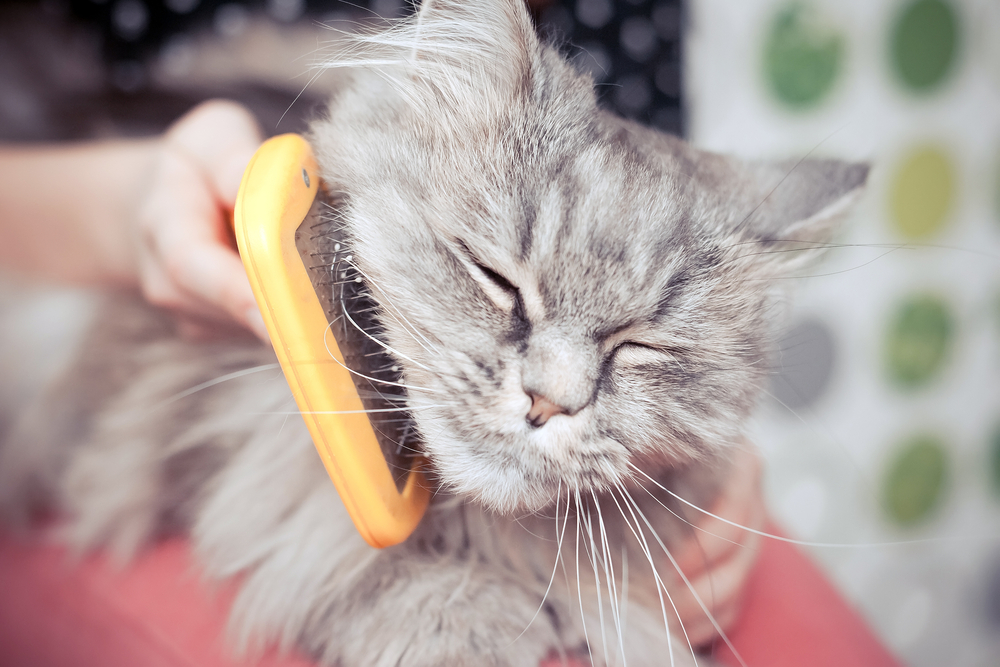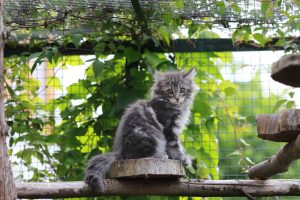Remedies For Cat Hairballs
 October 20, 2017
October 20, 2017
Is your cat suffering from a case of hairballs? We look at what you can do to help prevent hairballs and when you should be concerned at your cat’s constant hacking.
For some cat owners, the sound of your cat hacking and vomiting at the end of the bed is more effective to wake you up than an alarm, or even a strong cup of coffee! Only a cat lover would understand the drastic dance to remove the cat from the end of the bed when they have an attack of the hairballs.
A cat hairball, scientifically known as a trichobezoar (tricho meaning hair and bezoar meaning indigestible material in the digestive tract), Is caused by your cat’s insatiable desire to stay clean. As they groom, the dead hair becomes trapped on their tongue and is then swallowed. Mostly this hair will pass through their systems with no problems at all, but sometimes it will collect and become trapped as a hairball in the stomach.
It’s obvious what causes hairballs…hair. So, how can you help reduce the amount of hair your beloved pet is ingesting and how can you help prevent the coughing, hacking and vomiting in the first place? Here are some hairball remedies for your cat;
1. Grooming
Keeping your grooming regime up is imperative. Even short-haired breeds will require a light rub down to remove excess hair. This is especially important during seasonal changes. Another good tip is to keep grooming equipment easy to find. A good slicker cat brush pushed down the back of the couch will make grooming a regular part of television time shared with your ‘purring cushion’. By removing a daily dose of loose hair, you will prevent that hair from being ingested and ultimately reduce the number of hairballs. More on cat grooming and grooming supplies.
2. Diet
There are many hairball diets specially formulated to help cats who suffer from the attack of the hairballs. Having a diet full of fibre can help. These fibres help your cat break down the hair so it can move more freely through the digestive tract.
Concerns
When should you be concerned about your cat’s hairball issues? If your cat is coughing more often or losing weight, it’s important to seek veterinary assistance. Your cat shouldn’t be vomiting every day. If you notice your cat has hairballs in their litter box or is coughing up many hairballs, it’s a good idea to chat with your vet about a good treatment to help. Many cats suffering from large hairballs may become constipated or suffer from diarrhoea. However, ensuring you have a clean bill of health is vital as the coughing and vomiting could be a symptom of another problem.
EXPERT ADVICE – with Feline Veterinarian, Dr Kim Kendall, from the Cat Palace in Sydney
What is your best advice to prevent and treat hairballs in our cats?
“Flavoured Vaseline – the stuff in tubes for hairballs – shorthaired cats in the ‘coat changeover times’ in April and October 2 x weekly. Longhaired cats may need weekly – only Birmans seem to vomit hairballs regularly. Fibre – hairball diets do work.”
What shouldn’t you do?
“Give liquid paraffin orally unless chilled (it’s easy to breathe in otherwise).”
When should you be concerned?
“When a short haired cat vomits fur or food more than fortnightly, (any vomiting cat loses weight or goes off food), or if associated with diarrhoea or soft poos.”




